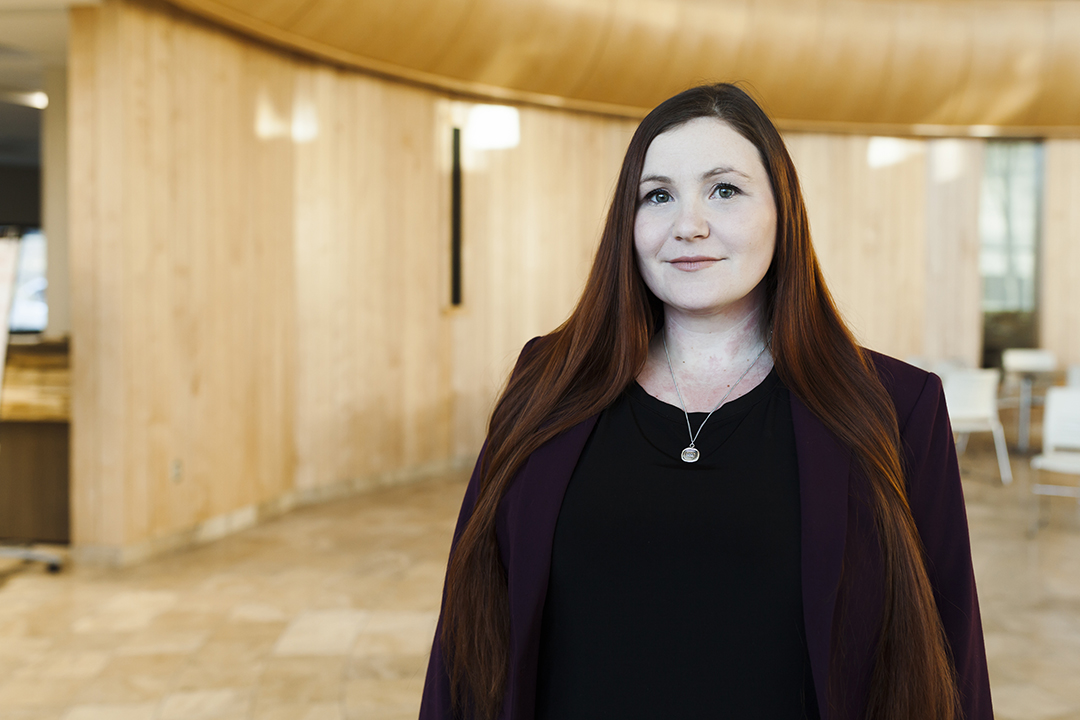
Kate Elliott is paving a path for Indigenous students in medicine
This week the University of Saskatchewan is celebrating the successes and contributions of Métis, First Nations and Inuit students, staff and faculty through Indigenous Achievement Week.
By John ShellingThe festivities include artistic performances, speakers’ panels and lectures in various locations across campus.
Each year, there is an awards ceremony to honour Indigenous students and to recognize their academic accomplishments, leadership, research endeavours or community volunteerism.
One of the award winners this year is Kate Elliott—a third-year Métis student in the College of Medicine—who is receiving an award for her exemplary leadership.
Elliott holds a Bachelor of Science in Nursing and a Masters of Public Health and Social Policy specializing in Aboriginal Health. She has shown exceptional leadership mentoring Indigenous youth, working with the Métis Nation strategic governance and programming nationally, and is currently a leader with Indigenous student groups in Medicine. Elliott has a desire to be an urologist and to work with Indigenous families and communities.
We caught up with Elliott to ask her a few questions about what motivates her.
Why did you decide to pursue a career as a physician?
My biggest motivation to go to medical school was to further my education, to be able to understand the health-care system as well as being able to help my community and be a better advocate for Aboriginal health in the future. I did a lot of Aboriginal youth advocacy back in B.C. I thought it would be good to work my way up within the medical system and this way I could get a better understanding of how the system works. As well, I’ve always been really passionate about health care and I really enjoy my education through medical school.
You mentor indigenous youth. What have learned from this experience?
I think again, working within health care or working with Indigenous youth, especially within health care we have a really rigid hierarchy and I think that’s not a very Indigenous concept. I like to look at the notion that health care is about reciprocal learning. I’ve had the opportunity to work with so many amazing youth over the years and have learnt that I might be a little older, I might have some education and some letters behind my name, but there is still a lot I can learn from them. It’s important to not speak from my voice but help speak from theirs. Being able to take some of our traditional teachings, especially humility, and learning from our patients is something I enjoy.
You received the award for leadership. Can you talk about one person you think is a good leader and what makes them so?
I have been really lucky to have a lot of amazing mentors in my life. I definitely wouldn’t be as far in my educational journey without them. When I look back and think about them I think a good leader has the respect of their community and that’s not reflected in titles or achievements. Respect is something that’s earned.
You are a third-year medical student, with a Bachelor of Science in Nursing and a Masters of Public Health and Social Policy specializing in Aboriginal Health. How do you make use of this mix of education in your practice?
I am a bit more of a mature medical student coming in and I think I definitely bring a lot of strengths from my previous education. I also worked as a long-term care aide. I’m able to bring that social determinate to health when working with patients and be able to look at the big picture. It’s really nice to tell patients that you have to get blood work once a week, but if there is no person in the community (able to take blood) that’s not something that’s feasible sometimes. So, I think that’s been really beneficial.
What advice would you give to a first-year indigenous student interested in going into med-school?
The best advice I can give is there’s lots of amazing people in pre-med and med-school, finding a mentor is really beneficial. It’s a really long hard road and it’s nice to have someone who’s walked the path before you. If an exam doesn’t go well, they can talk you through it and give you guidance and support. Having people in our lives that have walked that road and have helped pave that path is really inspiring and helps you through those harder days.
This interview has been edited and condensed.
To learn more about the events that are taking place this week, be sure to check out the Indigenous Achievement Week website.

